
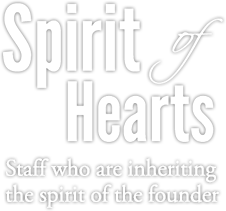
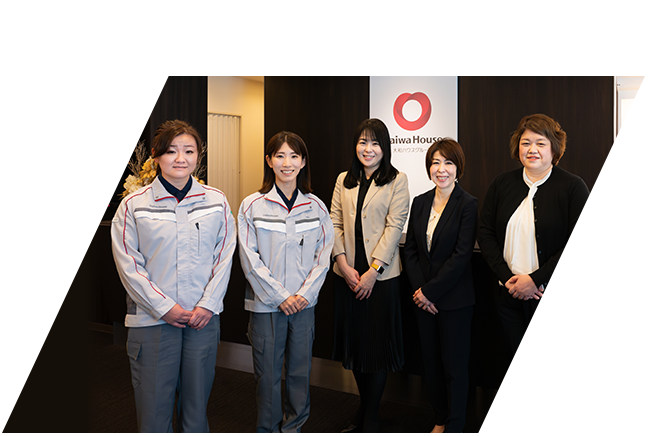
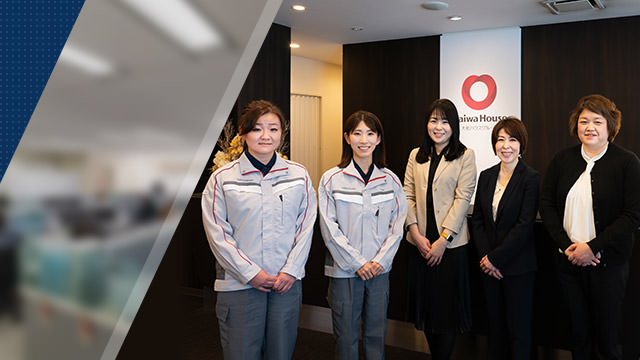 “Building Close Relationships with Our Customers”
It’s what we do to be a long-cherished and trusted company.
“Building Close Relationships with Our Customers”
It’s what we do to be a long-cherished and trusted company.
Here we present a new form of customer support, nurtured by listening attentively to the customer voices that we treat as valuable assets.

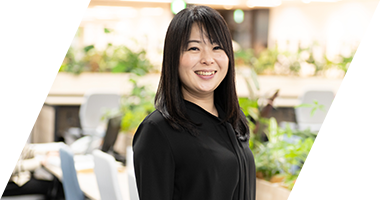

![]()
![]()
![]()

![]()
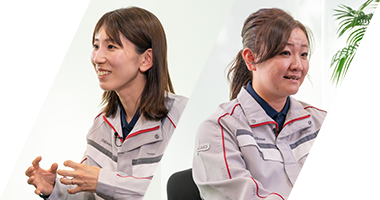
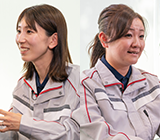
![]()
![]()


![]()
![]()


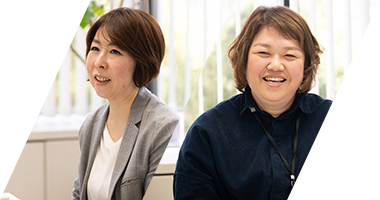
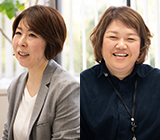
![]()
![]()

![]()
![]()
![]()
![]()
![]()
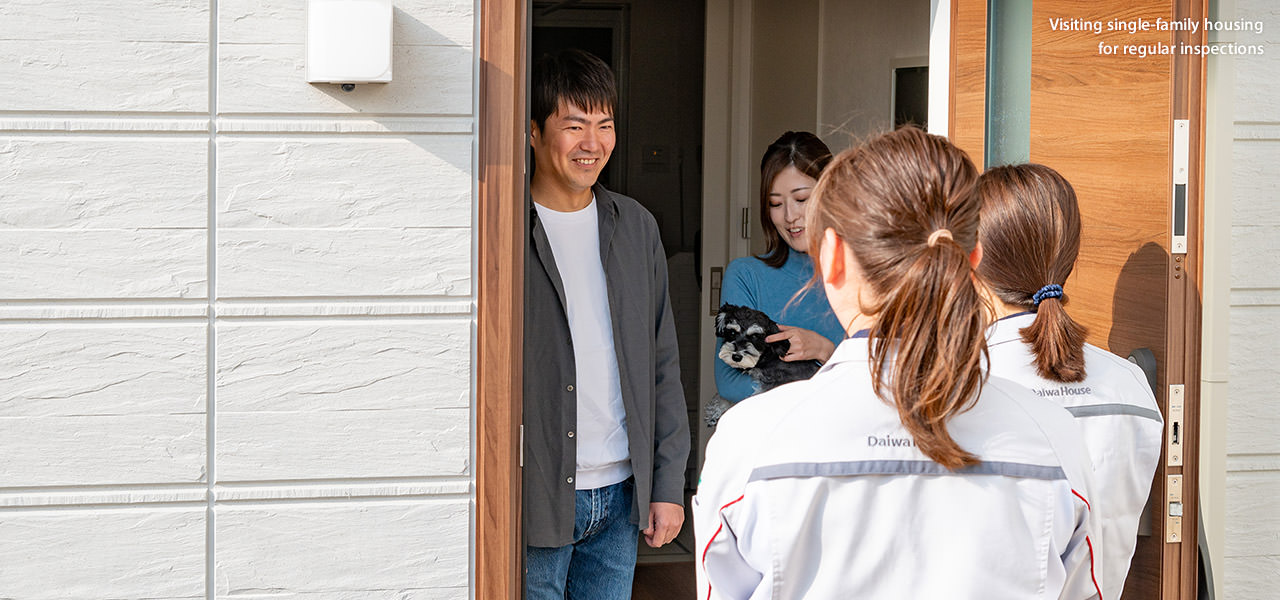
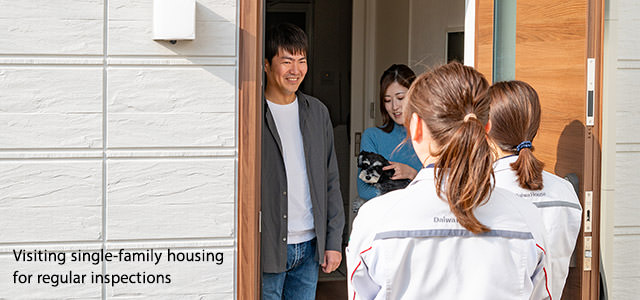

Shining a light on buried treasure
Every year, the Daiwa House Group engages with some 30 million customers. Among them are approximately 1.6 million households* or “home owners.” These are owners living in Daiwa House Industry’s single-family houses and condominiums, and owners who have built rental housing. Over the course of one to two years, we serve as an essential partner with those owners through our sales, design, construction and interior coordination activities. We support by conceptualizing plans, determining interiors, and even at times searching for land. The moment we present the keys to those completed buildings to owners, we can say, is the pinnacle of happiness for both the owner and for Daiwa House Industry.
Nonetheless, that one to two years is for that home a mere prologue—the real story starts when construction is completed. Supporting those roughly 1.6 million households from that point and throughout the home’s lengthy lifespan are the after-service support staff who provide critical value in maintaining the home over the long term.
Our customer support (CS) division that provides after service for homes offers a “Customer Center” with a call center to receive comments from owners, and a “Customer Support Center” in business sites nationwide that carry out inspections and improvements. These precious voiced comments from owners are consolidated in the CS Headquarters, and reflected into the improvement and development of products and services.
We receive approximately 220 thousand comments annually just for housing alone. These are truly intangible assets for the Daiwa House Group. Even so, this is an enormous volume of information that when delivered to our employees can get mixed in with and buried as they busily carry out their tasks. The result is that there is a repetition of similar comments from owners. Under these circumstances, we have made a number of improvements in the way we use information, but we must further communicate to all employees the importance of working on CS improvement. Driven by a sense of crisis, the CS Promotion Department went into action. Just as a tiny ant can get an enormous elephant to move, this was the first step that will shake the organization from within.。
*The total of housing customers for single-family houses* rental houses*, and condominiums constructed by Daiwa Housing Industry (*March 31, 2023)
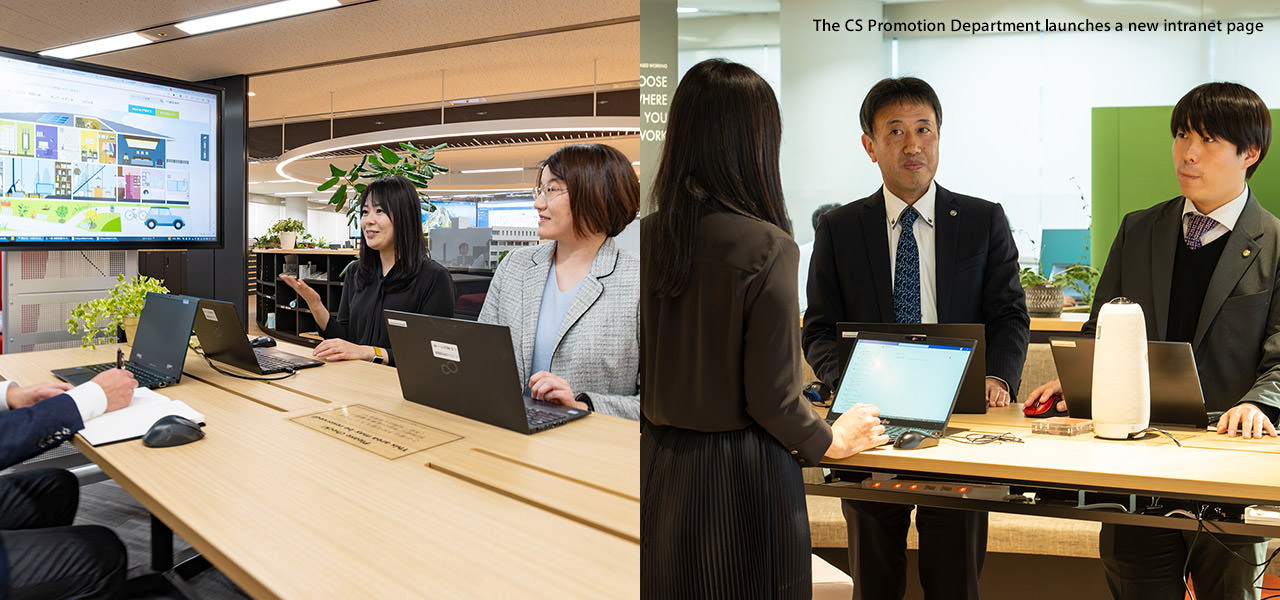
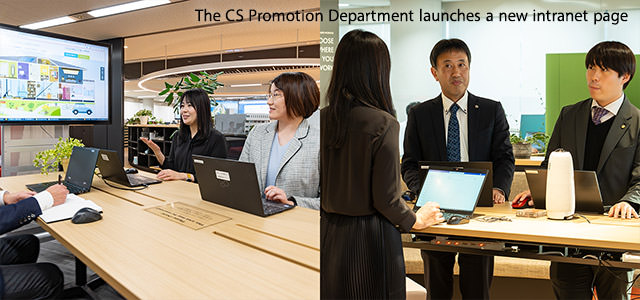

Sharing examples of failure and success
Having transferred to CS Headquarters from the Housing Division, Naoko Kurihara was impressed. “It was amazing how the people engaged in CS were so meticulous and earnest in their approach to each owner.”
Kurihara had been tasked to promote housing products and brand building for condominiums. The question was how to add an extra bit of value to the safety, security, and comfort demanded by home owners and communities, and how to create good, sellable products. This was a natural perspective in carrying out business activities, but she had no idea about CS beyond that. “Why is it that within the company, myself included, there is no awareness of CS activities?”
The CS division made the motto of “treating each customer as an individual,” where we took the standpoint of each owner. “That was the same!” said Kurihara, who in the past had independently come up with the concept of “focusing on customers as individuals” in caring for their attention to detail and sense of values, and applying that to product development. Business and CS were inseparable, and for Daiwa House Industry, two sides to the same coin.
At its essence, the spirit of the Company’s founder lives on. “Think about what will please and be useful to people in the world, not what will make you money.” The answer to the question posed by the founder, “What will please people?” can be found among the voices of owners.
An issue for our CS division, Kurihara felt, was the lack of PR capability targeting audiences within and outside the company. So how could the important voices of owners be conveyed to our business sites in an easily understood manner? After struggling to answer that, we launched “Voice Yes,” a new intranet page. It offers as its concept “one home made from the voice of owners.” The page takes dispersed information and systematically organizes and displays it by office and division. It is also able to list up cases of complaints and failures, such as “I wish there was a switch for ‘that lighting’ here,” as well as solutions and ways to work around problems.
However, resolving a complaint is only a way to turn a negative into a zero. Our preferred goal is to raise the bar from a zero to a positive. Fortunately, customer surveys contain many words of praise for employees. Feedback for one employee in the Customer Support Center stated, “Every time I’m impressed that during regular checkups they fix everything, no matter how small.” A comment for a sales representative was “I think they can be a sales person who will be my lifelong asset.” A designer was praised with the comment, “Their stance is ‘the customer is always first,’ and that was a great relief.” For an engineer, the comment was “Not a ‘no,’ but in the line of ‘it’s possible’ and I appreciated that forward-looking attitude.”
From a zero to a positive. Just as with these cases, we also want to share the secret to exceeding owners’ expectations and receiving “very satisfied” customers. Therefore, as one of the contents of “Voice Yes,” we started “Compliment PROJECT,” which features outstanding employees and analyzes and introduces their ideas and practices. Our standard for selecting individuals is not their sales performance or position, but rather the degree of enthusiasm that emerges from surveys.
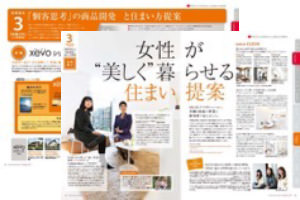
An early example of “treating each customer as an individual” (CSR Report 2011)
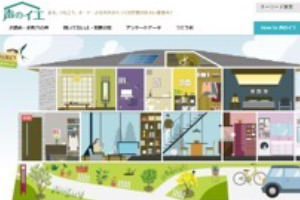
Intranet site “Voice Yes”
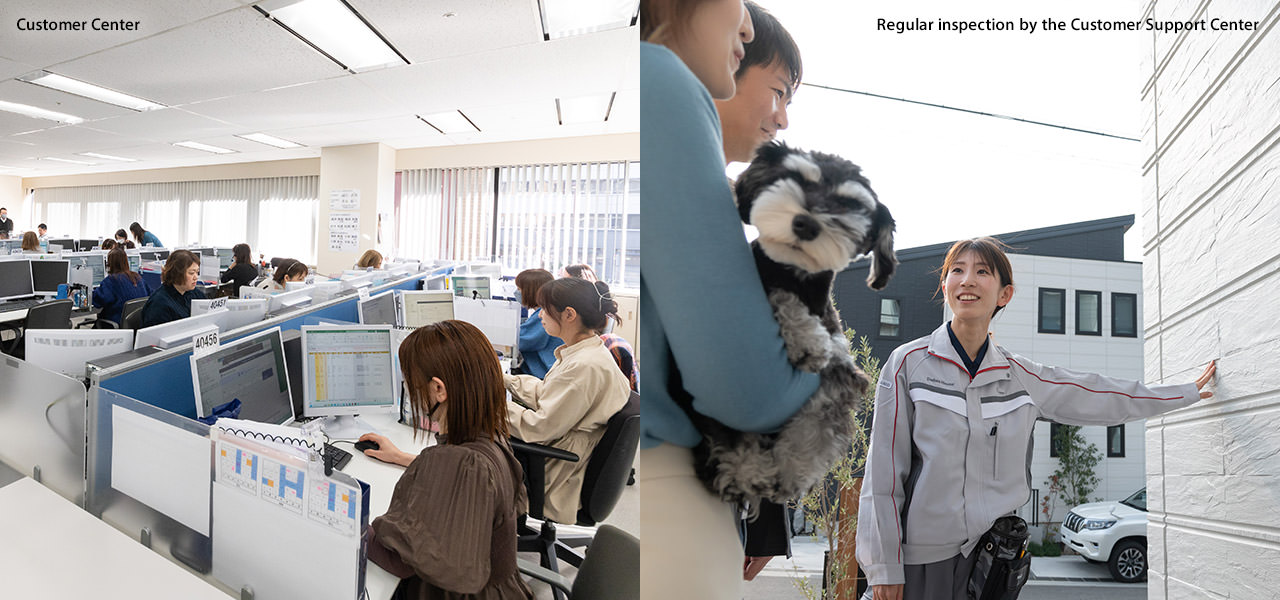
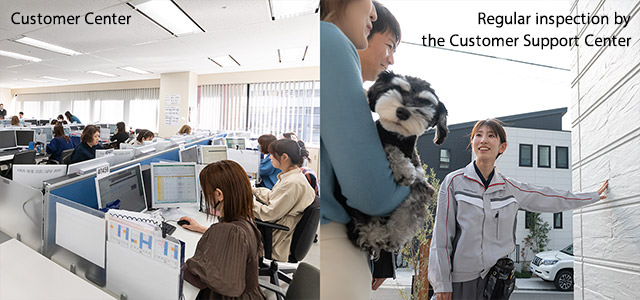

The people who work on the
front lines of CS
The Customer Center is comprised of a call center and a business center. Call center duties are entrusted to a reliable specialized company, and responses to queries, reports on progress status, and other communication are handled over the phone or SMS. In the event of a disaster, the center also stays in contact with business site employees and makes calls to check in on owners to confirm building status. The adjacent business center is staffed with dedicated Daiwa House Industry employees. State-of-the-art equipment such as HEMS* supports a one-stop response within the call center by providing instructions remotely while viewing on-site images and preparing and distributing necessary materials.
The business center’s Hiroko Nakanishi said, “Both centers are on good terms, and as it’s possible to exchange frank opinions, we can work to even further improve service.” Operators in the Customer Center in the Kansai region have long years of experience, and are highly skilled, learning to operate housing exhibits and equipment at exhibitions. When they receive a call, they can search for problems by reviewing building blueprints, and with straightforward issues they work to provide one-stop solutions over the phone.
Naturally, there are also times when callers voice complaints. The call center’s Junko Yoshimoto keeps in mind that “A complaint is an owner’s ‘grief.’ It’s a sad thing when there’s a problem with a home that should last a lifetime. So, in any case, it’s important to listen attentively.”
Meanwhile, the Customer Support Center conducts periodic inspections post-delivery and makes ad-hoc visits upon request. The Kobe Customer Support Center, just by itself, responds to 300 requests for such visits every month.
Mai Yoshikawa and Ai Maeba handle regular inspections, and on this day they are heading to a home to conduct an annual inspection. In tandem with building and equipment inspections, they provide advice and demonstrations on how to perform upkeep. As one owner mentioned, “I consult Daiwa House for anything, such as support for replacing a water purifier cartridge or to have them tell me how to open the side cover of a toilet.”
To live up to this trust, Yoshikawa and her teammates are on a daily quest for knowledge and information related to building materials and equipment from dozens of manufacturers, as well as pertaining to construction. If they notice scratches or that something is broken, they can ask questions like, “Is this door the only one with a loose hinge because a small child is trying so hard to open it?” which even extends to how people are living. While being cautious to not overstep the bounds of privacy, they keep their antennas up to get a sense of how a resident lives.
Owner satisfaction will likely be even higher if, in addition to after-sales service staff, those engaged in sales, design, construction, and even interior coordinators all pool their wisdom and experience after construction is completed. The main part of a home’s story begins after construction is completed, and Daiwa House Industry’s role is to continue its support over the long term.
*Home Energy Management System. A management system that enables visualization of energy usage and optimal control of equipment.
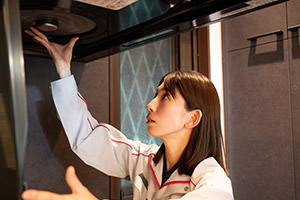
How to remove a range hood, and other advice
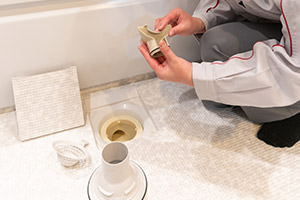
Removing and inspecting drain components in a shower room
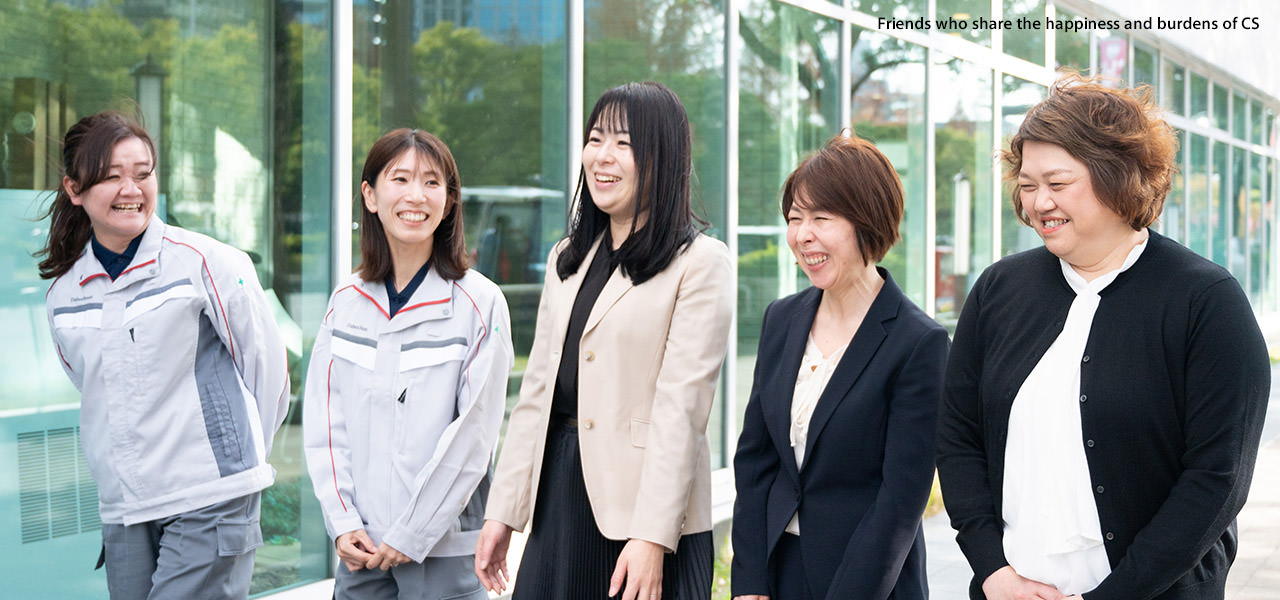
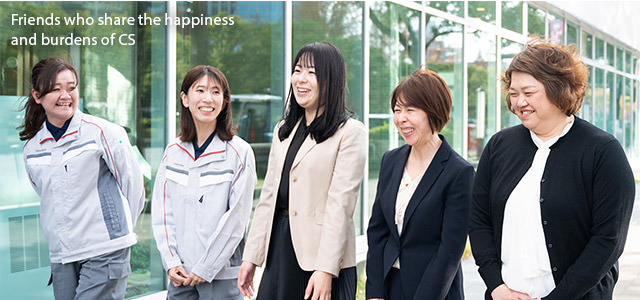

Becoming a company
cherished and trusted by customers
Those people on the front lines of CS, who over decades support property owners, are the treasure of Daiwa House Industry. They know that “being complete in small things” and practicing what they should do as a matter of course will lead to trust. They do not give speeches about their hard work and achievements. With this in mind, Kurihara’s role is to give voice to those on the front lines with “Voice Yes” and along with the voices of the owners, convey them within the company. 。
We also have success stories. At the debut of “ xevo Σ (sigma),” our steel-framed housing product, we leveraged its seismic resistance capability as a sales point. But when we made our visits to survey home owners, we were repeatedly told that “high ceilings offer spacious comfort.” So, a year and a half after the start of sales, we changed the axis of our marketing communication to promote its “ceiling height of 2m 72cm,” and that led to expanded “ xevo Σ” sales.
“Voice Yes” is disseminated to all Daiwa House Industry employees and Daiwa House Reform, a Group company. Initially, the number of views per article averaged roughly 400, although now it is up to 2,000. “Compliment PROJECT” has also grown into popular content as it exceeds 9,000 unique users.
A survey taken two years after its inauguration revealed that “Voice Yes” is being used in a variety of settings, including design proposals, completion inspections, communication with owners during construction, and training. Indeed, even in housing product development, having received the comment of “counters are not needed in a shower room,” we added such a shower room to our lineup.
Employees in charge of other businesses, such as distribution stores, are also highly interested. Moreover, it is a valuable site for administrative divisions, such as accounting, general affairs, and construction supervision, to hear from owners. “Voice Yes” has brought awareness and stimulating information across departments and occupations. The goal is to further expand its content, increase awareness, and promote our CS philosophy.
The Daiwa House Group is developing its business and activities with customer relations as a top priority. One such project, the Livness Town Project, which is recultivating and revitalizing a formerly developed detached housing complex, is also utilizing the “Voice Yes.”
Each individual measure we can add to our diverse range of CS activities in this way offers owners yet another reason for happiness and a smile, and this in turn will bring smiles to the faces of employees. As this virtuous spiral of happiness continues without limitation, it will certainly transform into an intangible corporate asset of value by the time the company celebrates its centennial anniversary in 2055. Our aim is to every day be “being complete in small things,” and in times of crisis, to be a “public institution of society” that can be relied upon. Each of us should be a proud member of “a company cherished and trusted by our customers,” as stated in our CS philosophy.
*Stated information is as of December 2023.
-
 "A Free Hand to Design a New World of Luxury Houses"
"A Free Hand to Design a New World of Luxury Houses"
-
 "The next mission in construction business"
"The next mission in construction business"
-
 "An Athlete’s Flying Start to His Second Life"
"An Athlete’s Flying Start to His Second Life"
-
 "Tackling the Challenges of Carbon Neutrality"
"Tackling the Challenges of Carbon Neutrality"
-
 "Building Close Relationships with Our Customers"
"Building Close Relationships with Our Customers"
-
 "Transforming the Construction Sector with DX"
"Transforming the Construction Sector with DX"
-
 "Bringing Ever-More Joy to Travel in Japan"
"Bringing Ever-More Joy to Travel in Japan"
-
 "Regeneration" Arises from New Construction
"Regeneration" Arises from New Construction
-
 "An Enduring Spirit of Hospitality"
"An Enduring Spirit of Hospitality"
-
 "Collaborating with 16 creators invited from around the world"
"Collaborating with 16 creators invited from around the world"
-
 "Passing Down Hometown to Future Generations with Renewable Energy"
"Passing Down Hometown to Future Generations with Renewable Energy"
-
 "The twenty-first century will be wind, solar, and hydro"
"The twenty-first century will be wind, solar, and hydro"
-
 "Be a Pioneer in the Design Revolution"
"Be a Pioneer in the Design Revolution"
-
 "Building better places to live through partnership between the public and private sectors"
"Building better places to live through partnership between the public and private sectors"
-
 "Supporting the foundations of the nation"
"Supporting the foundations of the nation"
-
 "Continuing to work the rest of life"
"Continuing to work the rest of life"
-
 "Doing our best to support post-disaster reconstruction"
"Doing our best to support post-disaster reconstruction"
-
 "Defying common wisdom in housing construction"
"Defying common wisdom in housing construction"
-
 "Develop the American market!"
"Develop the American market!"
-
 "Exporting Japanese industrial parks"
"Exporting Japanese industrial parks"
-
 "Industrializing agriculture"
"Industrializing agriculture"

